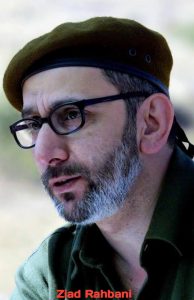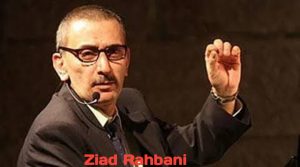Ziad Rahbani Biography – Life, Music, Political Satire & Legacy
Ziad Rahbani Biography
Ziad Rahbani (born 1956 in Antelias, near Beirut; died 26 July 2025) was a Lebanese composer, pianist, playwright, and cultural critic. The son of music legends Fairuz and Assi Rahbani, Ziad carved a powerful artistic identity of his own, blending jazz, funk and Arabic tradition with biting satire that challenged Lebanon’s sectarian politics and social inequalities.
Here’s a comprehensive overview of Ziad Rahbani’s life, background, education, and contributions—including details of his schooling.

Ziad Rahbani Early Life & Education
Born in 1956 in Antelias, just north of Beirut, Lebanon. He was the eldest son of renowned composer Assi Rahbani and legendary singer Fairuz .
Attended the College Notre‑Dame de Jamhour, a Jesuit-run school, where he received a rigorous and liberal arts‑oriented education .
Immersed in a highly musical and theatrical family environment, Ziad composed his first major song at age 17, Saʾalouni El Nass, for his mother, which propelled him into cultural prominence .
Ziad Rahbani Artistic Emergence & Early Works
At 17, he premiered his debut play “Sahriyyeh” (An Evening Gathering) in the early 1970s, marking the start of his theatrical career .
Shortly after, Nazl el‑Sourour (“Happiness Hotel”, 1974) showcased his sharp critique of Lebanese social stratification and political elites in a tragicomic tone .
Later theatrical works such as Bennesbeh Labokra Chou? (“What About Tomorrow?”) further solidified his reputation. These works blended dark satire, absurdist dialogue, and socio-political commentary reflecting post‑war disillusionment.
Also Read: Viktor Gyökeres Biography: Career, Stats, Net Worth & Personal Life
Ziad Rahbani Music & Style: Oriental Jazz
Rahbani created a signature musical style that fused Arabic melodies, jazz, funk, and classical influences, a hybrid sometimes referred to as “oriental jazz” .
Notable compositions include songs like “Kifak Inta”, “Bala Wala Shi”, and the 1978 album Abu Ali—which featured funk‑inflected, jazz‑driven rhythms for the Arabic music scene .
He composed around a dozen albums and many songs for Fairuz and other Arab artists (e.g. Latifa, Salma Mosfi, Joseph Sakr) .
Ziad Rahbani Political Voice & Intellectual Engagement
A lifelong Marxist and affiliate of the Lebanese Communist Party, Rahbani was outspoken in his criticism of sectarianism, corruption, inequality, and injustice through plays, radio shows, journalism, and public commentary .
From 1976 until 2015, he hosted satirical radio programmes and wrote provocative articles in outlets including Al‑Akhbar, An‑Nidaa, and An‑Nahar .
His persona combined dark humor, sarcasm, and a refusal to conform, making him a moral voice for Lebanon’s marginalized.

Ziad Rahbani Recognition & Legacy
President Joseph Aoun called him “a living conscience, a rebellious voice against injustice, and an honest mirror of the marginalized”, while Prime Minister Nawaf Salam described his death as a national loss .
His early plays and music became iconic, especially during the Lebanese Civil War (1975–1990), shaping national discourse and expression through art .
Although reclusive in later years, younger generations rediscovered his work via the internet and protest movements, reaffirming his cultural resonance .
Ziad Rahbani Summary Table
Feature Key Details
Ziad Rahbani Birth & Background Born 1956, Antelias; son of Assi Rahbani & Fairuz; educated at College Notre‑Dame de Jamhour
Education & Early Talent Debuted as composer at 17; early theatre work at high school age
Innovative Style Fused jazz, funk, Latin, classical, Arabic melodies into “oriental jazz”
Theatrical Career Notable plays: Sahriyyeh, Nazl el-Sourour, Bennesbeh Labokra Chou?
Political Engagement Marxist, CBC affiliate, columnist, and satirist via theatre and radio
Cultural Impact Influential to multiple generations; still cited as voice of conscience
Awards & Honors Widely praised by Lebanese leaders and artists for creativity & integrity.
Also Read: Nentawe Yilwatda Biography: APC’s New National Chairman in 2025
Why Ziad Rahbani Education and Background Matter
Though Ziad Rahbani did not follow a conventional academic route into music or drama studies, his Jesuit schooling exposed him to critical thinking and classical arts. Combined with his family’s musical legacy and encouragement from an early age, this environment enabled him to develop as a self‑taught composer, playwright, piano virtuoso, and public intellectual.
Ziad Rahbani Early Life and Background
Ziad Rahbani Born on 1 January 1956 in Antelias, north of Beirut, Ziad was raised in a home immersed in music and theater. By age 17 he composed his first song for his mother—Sa’alouni El Nass—which became an instant hit.
Ziad Rahbani Musical Style and Major Works
Oriental Jazz Pioneer: Ziad redefined Arabic music by fusing Western jazz, funk and classical harmony with traditional Arabic melodies. His landmark album Abu Ali (1978) exemplifies this unique style.
Popular Compositions for Fairuz: He composed many influential songs for her, including Ouverture 83, Bala Wala Chi, Kifak Inta?, and Sallimli ‘Alayh.
Prolific Theater Works: His debut play, Nazl el‑Sourour (Happiness Hotel), premiered in 1974 and delivered bold social commentary. Subsequent plays like Bennesbeh Labokra Chou?, Film Ameriki Tawil, and others used political satire to critique Lebanese society.
Ziad Rahbani Biography Political Engagement and Cultural Critique
Ziad’s artistic expression was deeply intertwined with his political convictions. A self-described leftist and supporter of Palestinian causes, he created radio shows, articles, and theatrical works that skewered corruption, sectarianism, and class injustice. His tone was irreverent, intellectual, and defiant—qualities that earned him both admiration and controversy.
Ziad Rahbani Later Life and Passing
Ziad Rahbani gradually withdrew from public life, yet his work remained influential—especially among newer generations discovering his music and plays online. He passed away in a Beirut hospital on 26 July 2025, aged 69, reportedly of a heart attack. His death sparked tributes from across the Arab world, with Lebanese President Joseph Aoun calling him “a complete intellectual and cultural phenomenon.”
Ziad Rahbani Legacy and Cultural Influence
Ziad Rahbani’s legacy spans multiple artistic mediums:
Ziad Rahbani Musical Innovation: He reshaped Arabic music and inspired fusion trends with his bold hybrid compositions.
Ziad Rahbani Theatrical Impact: His plays remain classics in Lebanese cultural memory, known for their wit, absurdist dialogue, and unflinching political commentary.
Ziad Rahbani Political Voice: He gave Lebanon a rebellious conscience, amplifying the struggles of the marginalized. His irony and satire continue to resonate in protest movements and youth culture.
Ziad Rahbani (1956–2025) was a towering figure in Lebanese culture—a composer, pianist, playwright, and sharp-tongued cultural critic. Born near Beirut to legendary singer Fairuz and composer Assi Rahbani (of the Rahbani Brothers), he emerged early as a musical prodigy, composing his first song at just 17 for his mother .
Artistic Vision & Influence
In the 1970s and 80s, Rahbani pioneered an “oriental jazz” that fused Arabic melodies with jazz, funk, and classical elements—resonating deeply in Lebanon’s embattled cultural landscape .
His music and lyrics were bold and introspective—songs like “Kifak Inta”, “Bala Wala Shi”, and “Abu Ali” captured both personal sentiment and societal critique .
As a playwright, Rahbani satirized class inequalities, war, and corruption. His debut, Nazl el‑Sourour (“Happiness Hotel,” 1974), portrayed workers challenging elite repression; his later Bennesbeh Labokra Shou? (“What About Tomorrow?”) explored post-war disillusionment with biting wit and surrealism .
Political Voice & Legacy
A lifelong leftist and affiliate of the Lebanese Communist Party, Rahbani used theatre, satire, radio, and journalism to criticize sectarianism, inequality, and political corruption in Lebanon .
Though he retreated from public performances in later years, his work continued to inspire new generations—its themes resurfacing in protests and online rediscovery .
Recognition & Farewell
On July 26, 2025, Rahbani passed away at 69 in Beirut, reportedly from a heart attack. Lebanese leaders hailed him as a “cultural phenomenon” and “voice of conscience” that embodied the struggle for justice and dignity in Lebanon .
President Joseph Aoun called him “a living conscience… a rebellious voice against injustice,” while Prime Minister Nawaf Salam described him as “an exceptional and creative artist… true to the values of justice and dignity” .
At a Glance
Category Highlights
Family & Roots Son of Fairuz and Assi Rahbani; musical royalty
Early Career Composed for Fairuz at 17; debut play in 1974
Style Fusion of Arabic, jazz, funk, classical
Plays & Themes Nazl el‑Sourour, Bennesbeh Labokra Shou?—addressed class and politics
Political Role Sharp satire, uncompromising leftist voice; critic of sectarianism and power
Legacy Inspired multiple generations; cultural icon in Lebanon
Ziad Rahbani’s influence spread far beyond his compositions. He reshaped Lebanese cultural expression, blending artistic innovation with political critique. His works remain etched into Lebanon’s collective memory—a testament to his intellect, creativity, and uncompromising honesty.
Frequently Asked Questions (FAQ)
When and where was Ziad Rahbani born?
He was born on 1 January 1956 in Antelias, near Beirut, Lebanon.
Who were his parents?
He was the son of iconic singer Fairuz (Nouhad Haddad) and composer Assi Rahbani, one half of the Rahbani Brothers.
What musical genre did Ziad Rahbani pioneer?
He pioneered “oriental jazz”, blending Arabic melodies with jazz, funk and Western classical influences.
What are his most famous plays?
Notable works include:
Nazl el‑Sourour (Happiness Hotel) (1974)
Bennesbeh Labokra Chou? (What About Tomorrow?)
Film Ameriki Tawil (A Long American Film)
All feature sharp political satire and social commentary.
When did Ziad Rahbani pass away?
He died on 26 July 2025 in Beirut at age 69, reportedly of a heart attack.
How is his legacy remembered today?
He is remembered as a transformative figure in Arab music, theatre and culture—an artist whose satirical lyricism and hybrid compositions continue to influence new generations. His status as a political icon remains influential.
